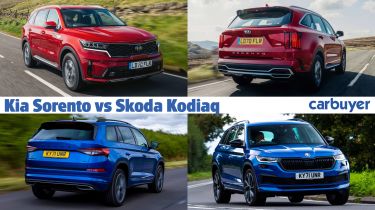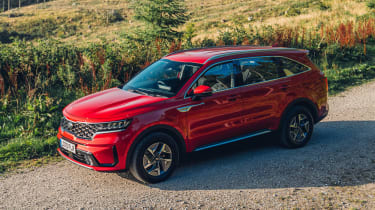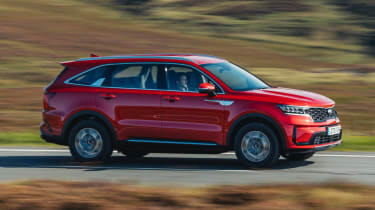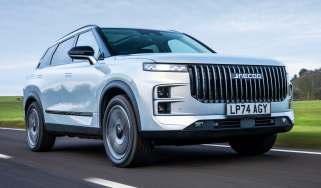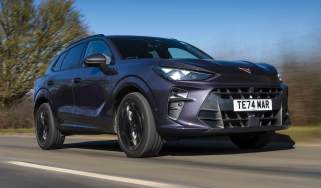Kia Sorento vs Skoda Kodiaq - rivals comparison
Both seven-seat SUVs are worth your money but which one should you buy?
SUVs have become the car of choice in the UK as buyers search for high-riding family models instead of saloons and estates. It’s a competitive market and choosing the right SUV isn’t always easy. Our guide to the best SUVs and 4x4s is a great place to start your research but here, we’ve focused on a comparison between the latest Kia Sorento and the Skoda Kodiaq, two of our favourites, to see which is best.
The Kia Sorento is a large, seven-seater SUV that's practical, makes a great tow car and should prove very reliable. The latest model is more upmarket than ever and, as a result, has become a viable alternative to cars traditionally viewed as more ‘premium’. The Nissan X-Trail is also a seven-seat SUV but the Sorento is a little more expensive and more modern. In fact, the range-topping ‘4’ version of the Sorento also takes on the Volvo XC90 and Land Rover Discovery Sport.
 The best 7-seater cars to buy in 2025
The best 7-seater cars to buy in 2025
The Skoda Kodiaq is another close rival to the Sorento and is Skoda’s largest SUV, also available with up to seven seats. Its size means it competes with the likes of the Peugeot 5008, Hyundai Santa Fe, SEAT Tarraco and the Volkswagen Tiguan Allspace.
The Kodiaq has a price advantage where the competition is concerned, especially given it’s a seven-seater. It’s worth noting that you’ll need to spec this on entry-level SE cars (it’s standard on all other trims) but even with the upgrade taken into account, you can still buy a seven-seat Kodiaq for less than £30,000. You probably wouldn’t be considering a Sorento if you’re looking at a cheaper Kodiaq but high-spec cars occupy the same price bracket as the Kia.
Skoda gave the Kodiaq a facelift in 2021 and the new car is noticeable by its updated headlights and rear lights. There are new options inside, including seats that have ventilation and massage functions, while the sporty Kodiaq vRS model has returned to the range. This time around, the vRS has a 242bhp petrol engine that’s shared with the Volkswagen Golf GTI, rather than a bi-turbo diesel engine.
Styling
The Sorento has taken on a more aggressive appearance in its latest guise. It’s 10mm longer than it was before and features more angular looks. Its front grille is lined with a chrome border that extends beyond the narrow LED headlights and, at the rear, it’s gained vertical tail lights.
The Kodiaq’s styling is slightly smoother with a front-end heavily inspired by the Superb. It features some angular detailing, such as sharp, sweeping headlights and a prominent grille. At the back, meanwhile, are squared-off tail-lights and Skoda’s trademark crease slicing the bootlid in two.
Interior
The Sorento has been given a full design overhaul inside and gained more tech, making it feel much more upmarket than it did before. In fact, it feels like you could be in a more expensive SUV from one of the brands traditionally considered more prestigious. The digital instrument cluster and central display sweep across from behind the steering wheel and perch above a thin dashboard. The upper dashboard is finished in soft-touch leather, while ambient lighting illuminates the dashboard and door panels.
The Kodiaq features a functional rather than flamboyant interior design but it’s smart enough and equipped with a number of features to keep passengers entertained. Its strongest points are the build quality, however, and how comfortable it is. We particularly like the suede-style seats in the Sportline model. Vertical dashboard air vents are both bold and unconventional in their portrait-orientation, which does add a little visual interest. The glass-fronted infotainment touchscreen, meanwhile, looks genuinely swish, and the materials used throughout the interior are of high quality.
Prices and specs
The Sorento range kicks off with the '2' trim, priced from just under £40,000, which sits on 17-inch alloy wheels and gets LED front and rear lights. Inside, it’s equipped with a 12.3-inch instrument cluster and eight-inch infotainment screen with integrated Apple CarPlay, Android Auto, and a reversing camera. The '2' trim, however, is only available with the hybrid powertrain.
Move up to '3' and you get 19-inch alloy wheels, a 10.25-inch central screen, ambient lighting, leather upholstery and a powered tailgate. Be warned, though - this pushes the starting price over the £40,000 mark, which means you’ll incur the VED surcharge that makes your annual bill nearly £500. Diesel buyers will have to choose the ‘3’ trim. Kia's flagship Sorento '4' trim gains Nappa leather upholstery, a head-up display and a Bose stereo upgrade but is also hybrid-only.
In place of offering options, Kia prefers buyers to choose the trim level with all the kit they require. At present, ‘Premium Paint’ is listed for an additional cost of £650 but buyers can also choose from a range of accessories including tow bars and roof racks.
The Kodiaq, meanwhile, is available in five trim levels, with prices starting from just over £28,000 and rising to just over £42,000 - or £45,000 if you choose the sporty vRS. The mid-range SE L model is our pick of the range. It includes seven seats, which are finished in Alcantara suede fabric, and sits on 19-inch alloy wheels. You also get LED headlights, a power-opening boot, heated front seats and the full KESSY system (which includes keyless entry as well as keyless go).
Practicality
The Sorento scores high in terms of legroom and overall passenger comfort, especially for those in the first two rows. Space has been improved for third row passengers too. Since hybrid versions have their battery pack and electric motor placed beneath the floor, they have minimal impact on passenger or luggage space.
The diesel model boasts an impressive 616-litre boot space when the third row of seats is folded down. In the hybrid model, this is reduced to 608 litres and 604 litres in the PHEV. Fold both sets of rear seats forward, however, and storage space increases to 2,011 litres for the diesel, falling to 1,996 litres and 1,988 litres in the standard hybrid and PHEV models respectively. For comparison, the Land Rover Discovery Sport has a 754-litre boot, extending to 1,794 litres.
There’s one thing that all Kodiaq models have in common, regardless of price, and that’s space. Both front and rear-seat passengers get plenty of head and legroom, making even the longest journeys with five adults and lots of luggage a breeze - and the boot is enormous. The Kodiaq is available with five or seven seats but the third row is better suited to younger passengers.
The Kodiaq’s boot space totals 720 litres in the five-seater model, rising to 2,005 litres if you fold the rear seats, putting it well ahead of the Sorento. The seven-seater has a slightly smaller boot, at 630 litres with the third row folded down. It remains a usable size at 270 litres when all seven seats are in place.
Fuel economy and performance
The Sorento is available with a range of diesel, hybrid and plug-in hybrid units. The 2.2-litre diesel engine produces 199bhp and 440Nm of pulling power meaning, despite the Sorento's hefty weight, it can sprint from 0-60mph in a respectable 9.1 seconds. The diesel is paired with four-wheel drive and a new, notably smooth, eight-speed dual-clutch automatic gearbox.
The hybrid Sorento is powered by a 1.6-litre turbo petrol engine and an electric motor. Together, they produce a combined total of 226bhp. The powertrain is mated to a six-speed automatic gearbox and 0-60mph takes 8.7 seconds, making the hybrid slightly quicker than the diesel at full acceleration.
The plug-in hybrid, meanwhile, combines the same turbocharged 1.6-litre petrol engine and six-speed automatic gearbox as the standard hybrid but adds a more powerful electric motor and a larger 13.8kWh battery. The result is an increased power output of 261bhp and a 0-60mph time of 8.4 seconds.
The Kodiaq engine range starts with a 1.5-litre petrol engine, producing 148bhp and taking the SUV from 0-62mph in just under 10 seconds with a manual or automatic gearbox. The 187bhp 2.0-litre petrol engine, available on SE L trim models and above, is the more powerful petrol choice, but it’s more expensive and has a higher fuel consumption figure. It’s only available with four-wheel-drive and a seven-speed DSG automatic but cuts the 0-62mph sprint time to 7.6 seconds.
Last up is the Volkswagen Group’s proven 2.0-litre diesel engines. Of the two, we’d choose the 148bhp version, which has just the right amount of power and has a 0-62mph time of 9.7 seconds. There’s also a 197bhp version that can do the same sprint in under eight seconds, should the improved performance appeal to you.
Verdict
The space and value for money offered by these cars means that both are well worth considering. The Kodiaq is the obvious choice when it comes to passenger comfort and outright luggage capacity. However, if you’re moving away from a luxury saloon or estate, the quality offered by the Sorento, coupled with all the latest tech, will help with your transition into SUV ownership. The Sorento is a superb all-rounder, even if it costs a little more than the Kodiaq. We like it so much that it scooped our 2021 best large family car award and took the title of Car of the Year at the same time, so comes highly recommended.
Read our guide to the best large SUVs.
Recommended

New Subaru Trailseeker revealed as rugged electric SUV with 375bhp

New Subaru Solterra brings more range, power and polish
Most Popular

New Smart #5 Brabus is a 637bhp far cry from the brand’s city car past

Best car leasing deals 2025: this week’s top PCH offers
Tips & advice

Car dashboard warning lights: what does each symbol mean?

Electric car charging stations: public networks, charger types, apps and maps

